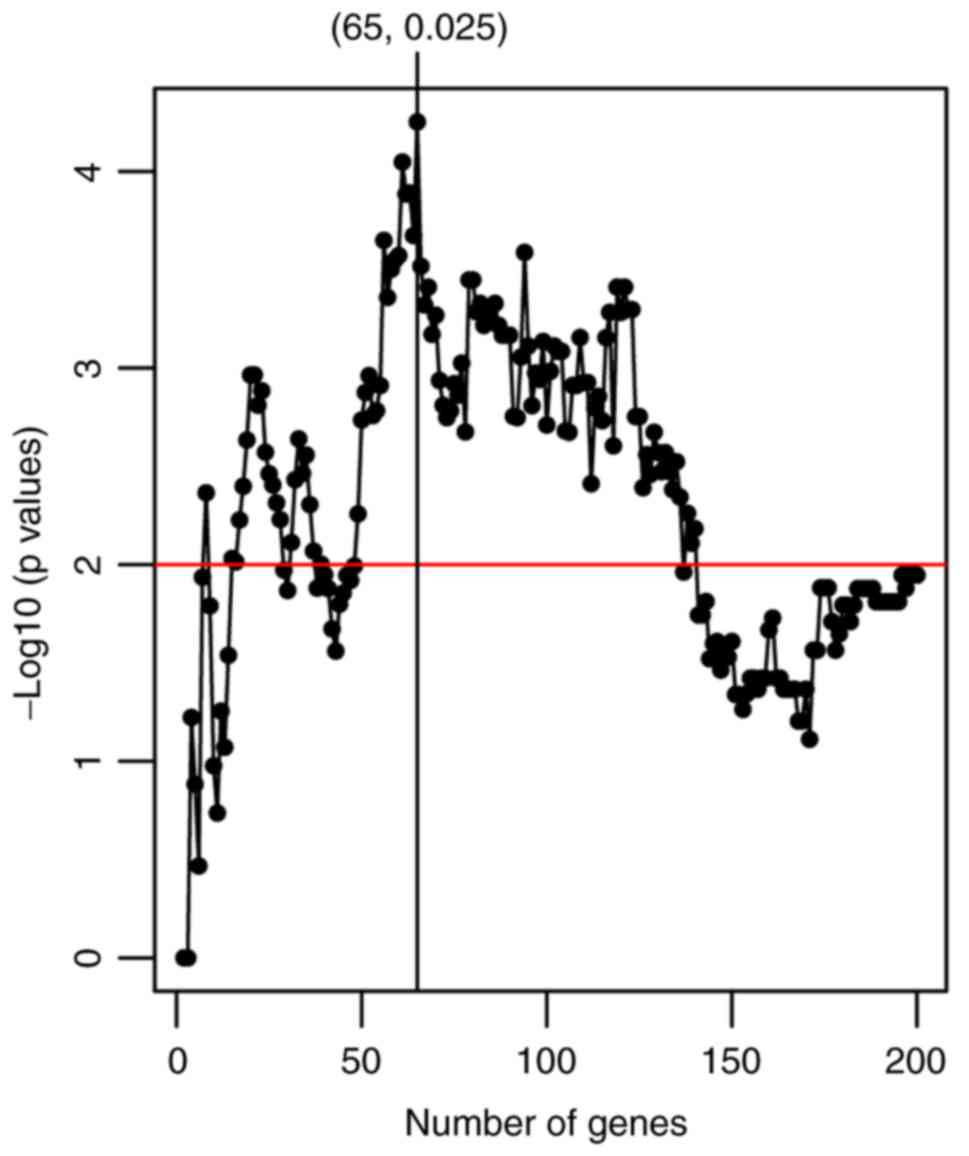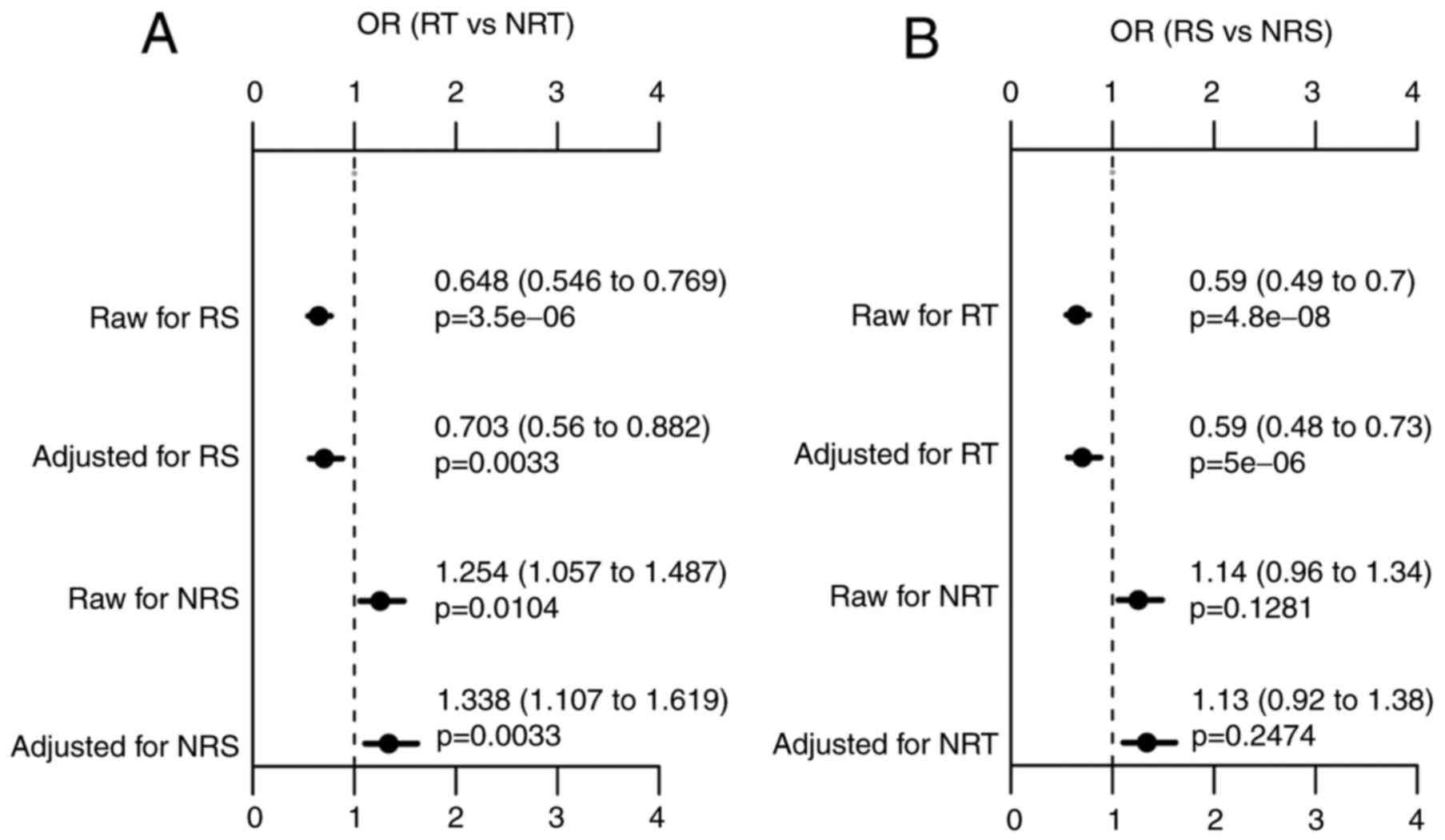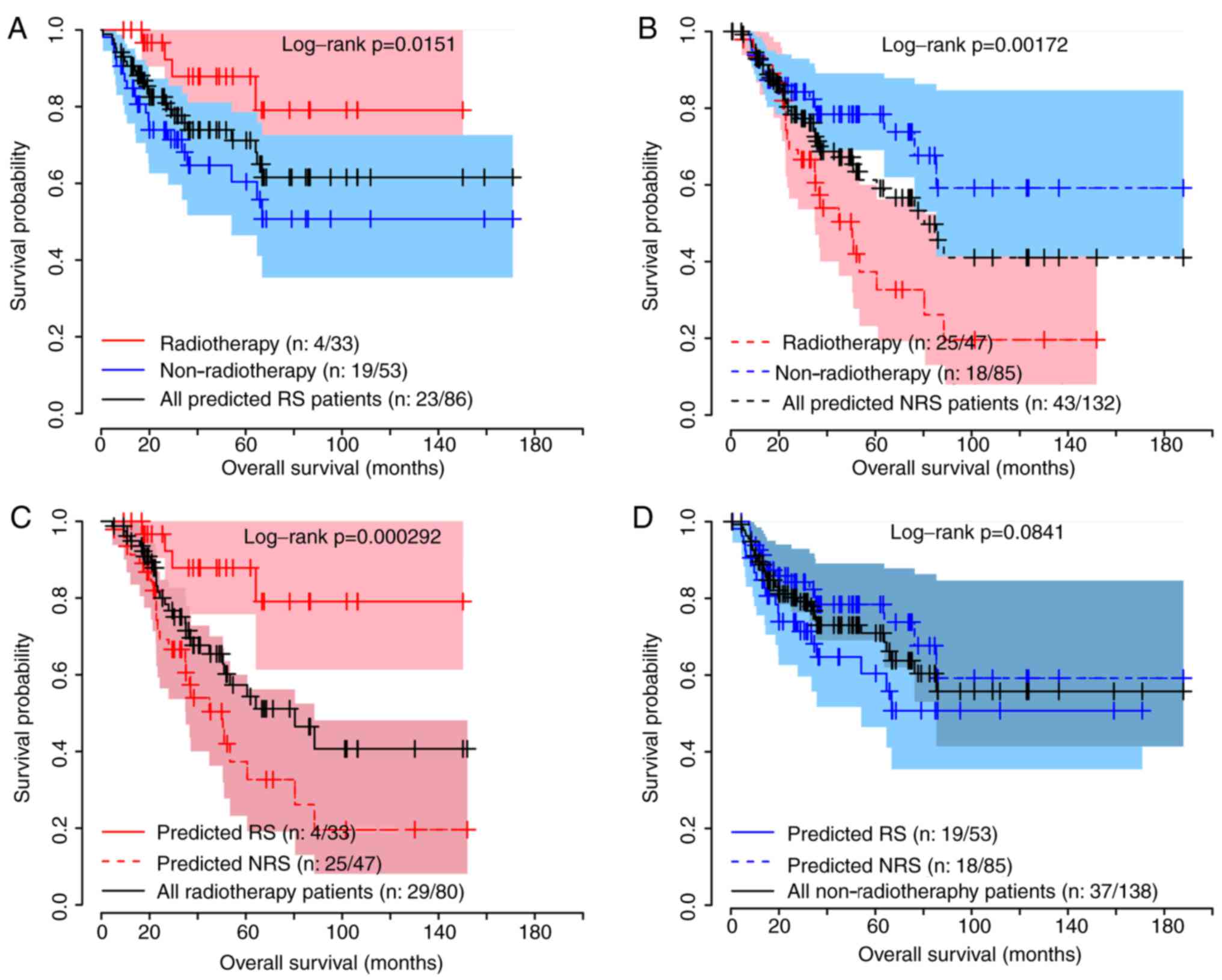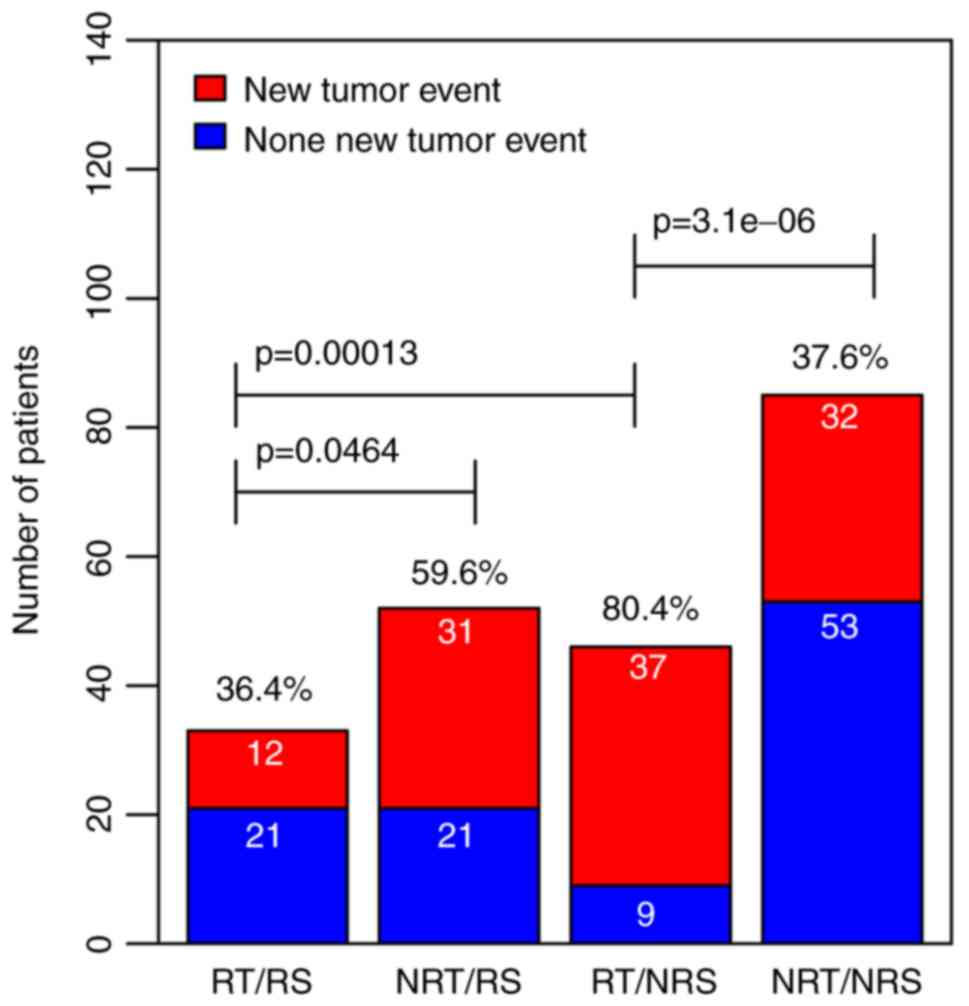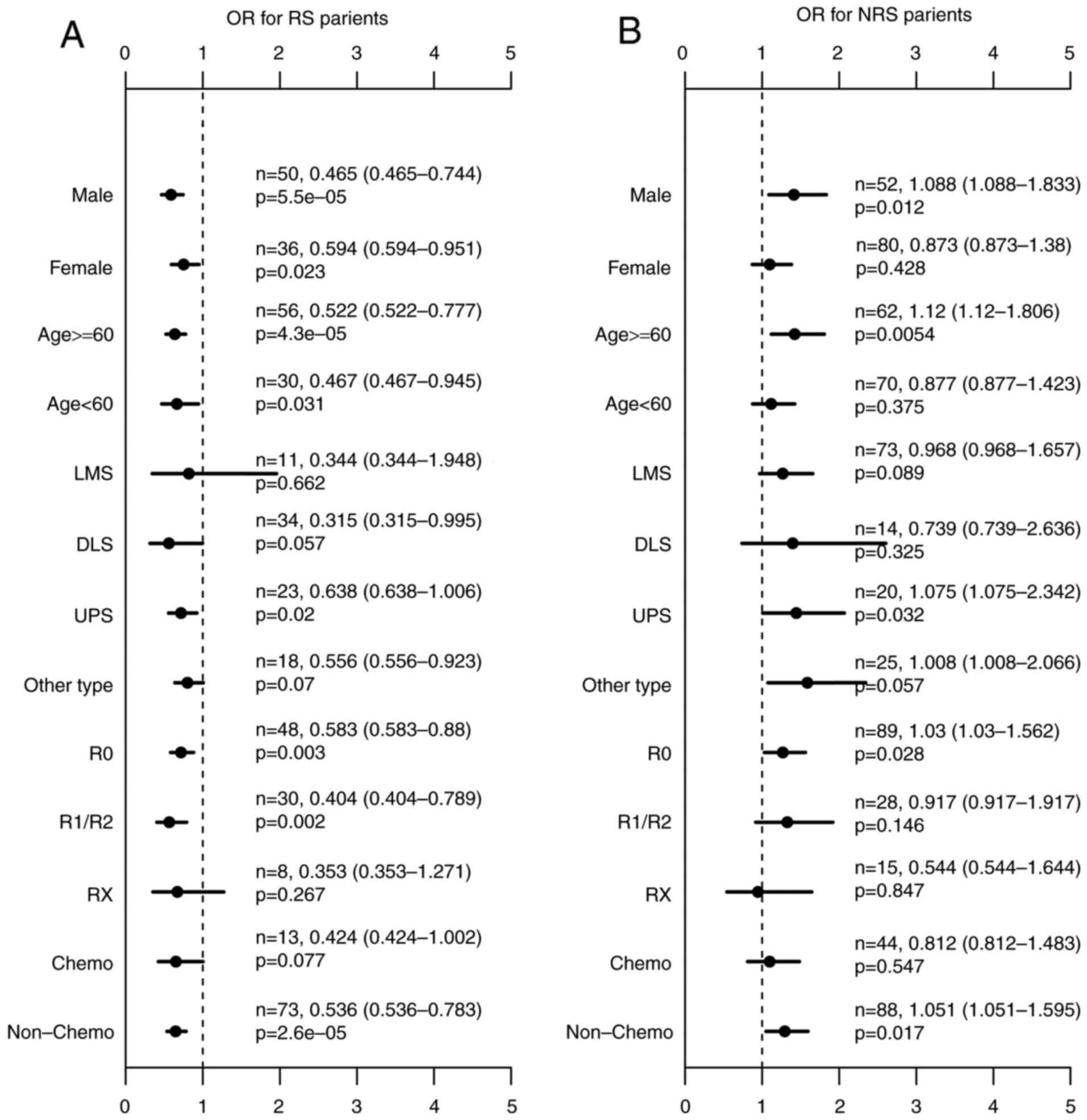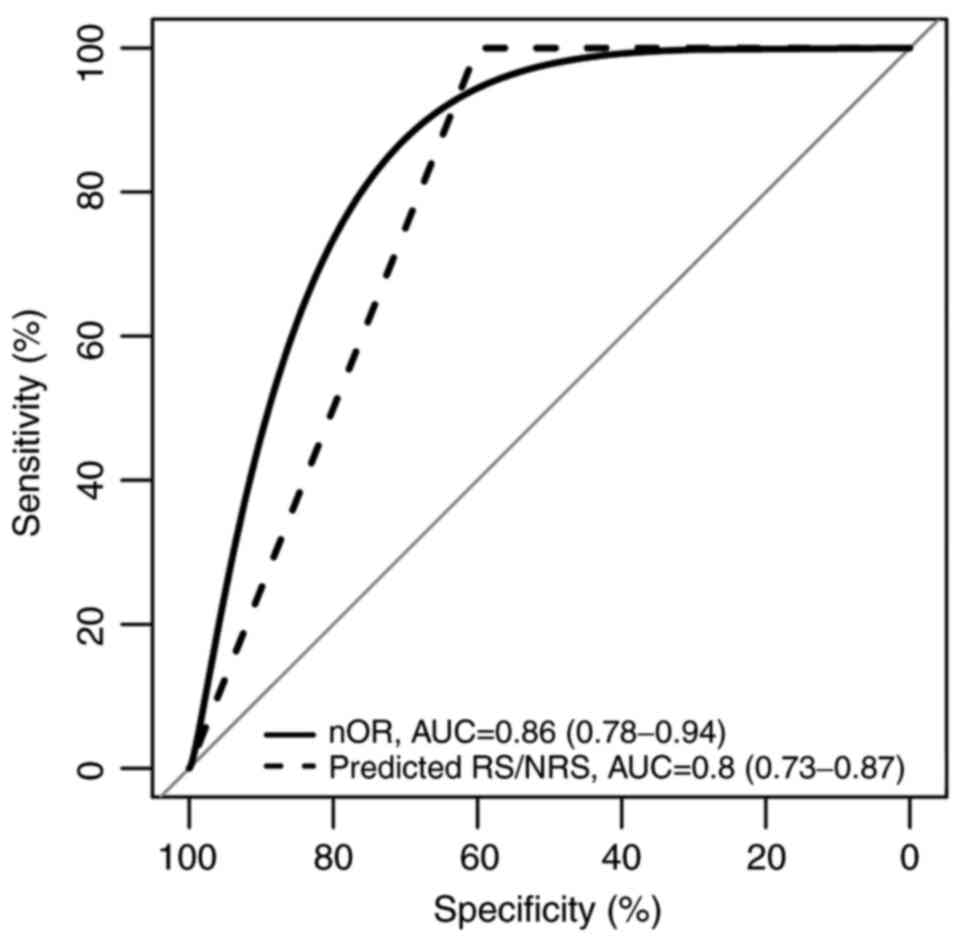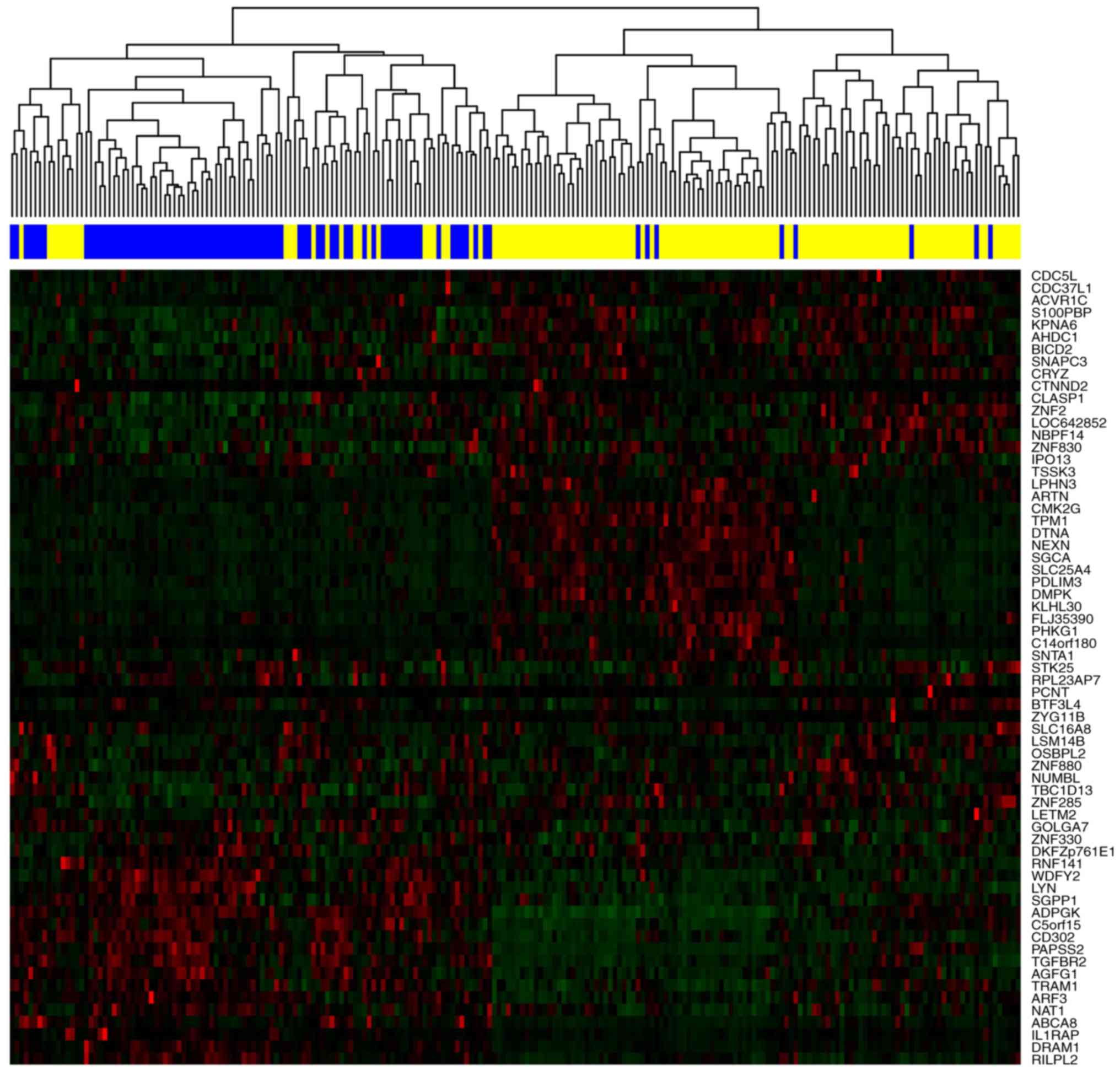|
1
|
Wibmer C, Leithner A, Zielonke N, Sperl M
and Windhager R: Increasing incidence rates of soft tissue
sarcomas? A population-based epidemiologic study and literature
review. Ann Oncol. 21:1106–1111. 2010. View Article : Google Scholar : PubMed/NCBI
|
|
2
|
American Cancer Society, . Cancer Facts
and Figures 2016. Atlanta, Ga: American Cancer Society; http://www.cancer.org/acs/groups/content/@research/documents/document/acspc-047079.pdf2016
|
|
3
|
von Mehren M, Randall RL, Benjamin RS,
Boles S, Bui MM, Conrad EU III, Ganjoo KN, George S, Gonzalez RJ,
Heslin MJ, et al: Soft Tissue Sarcoma, Version 2.2016, NCCN
Clinical Practice Guidelines in Oncology. J Natl Compr Canc Netw.
14:758–786. 2016. View Article : Google Scholar : PubMed/NCBI
|
|
4
|
Wang D and Abrams RA: Radiotherapy for
soft tissue sarcoma: 50 years of change and improvement. Am Soc
Clin Oncol Educ Book. 34:244–251. 2014. View Article : Google Scholar
|
|
5
|
Levy A, Bonvalot S, Bellefqih S, Vilcot L,
Rimareix F, Terrier P, Belemsagha D, Cascales A, Domont J, Mir O,
et al: Is preoperative radiotherapy suitable for all patients with
primary soft tissue sarcoma of the limbs? Eur J Surg Oncol.
40:1–1654. 2014. View Article : Google Scholar
|
|
6
|
El-Bared N, Wong P and Wang D: Soft tissue
sarcoma and radiation therapy advances, impact on toxicity. Curr
Treat Options Oncol. 16:192015. View Article : Google Scholar : PubMed/NCBI
|
|
7
|
Davis AM, OSullivan B, Turcotte R, Bell R,
Catton C, Chabot P, Wunder J, Hammond A, Benk V, Kandel R, et al:
Late radiation morbidity following randomization to preoperative
versus postoperative radiotherapy in extremity soft tissue sarcoma.
Radiother Oncol. 75:48–53. 2005. View Article : Google Scholar : PubMed/NCBI
|
|
8
|
Dickie CI, Parent AL, Griffin AM, Fung S,
Chung PW, Catton CN, Ferguson PC, Wunder JS, Bell RS, Sharpe MB, et
al: Bone fractures following external beam radiotherapy and
limb-preservation surgery for lower extremity soft tissue sarcoma:
Relationship to irradiated bone length, volume, tumor location and
dose. Int J Radiat Oncol Biol Phys. 75:1119–1124. 2009. View Article : Google Scholar : PubMed/NCBI
|
|
9
|
Pisters PW, OSullivan B and Maki RG:
Evidence-based recommendations for local therapy for soft tissue
sarcomas. J Clin Oncol. 25:1003–1008. 2007. View Article : Google Scholar : PubMed/NCBI
|
|
10
|
Strander H, Turesson I and Cavallin-Ståhl
E: A systematic overview of radiation therapy effects in soft
tissue sarcomas. Acta Oncol. 42:516–531. 2003. View Article : Google Scholar : PubMed/NCBI
|
|
11
|
Yang JC, Chang AE, Baker AR, Sindelar WF,
Danforth DN, Topalian SL, DeLaney T, Glatstein E, Steinberg SM,
Merino MJ, et al: Randomized prospective study of the benefit of
adjuvant radiation therapy in the treatment of soft tissue sarcomas
of the extremity. J Clin Oncol. 16:197–203. 1998. View Article : Google Scholar : PubMed/NCBI
|
|
12
|
Chibon F: Cancer gene expression
signatures - the rise and fall? Eur J Cancer. 49:2000–2009. 2013.
View Article : Google Scholar : PubMed/NCBI
|
|
13
|
Begg AC: Predicting response to
radiotherapy: Evolutions and revolutions. Int J Radiat Biol.
85:825–836. 2009. View Article : Google Scholar : PubMed/NCBI
|
|
14
|
Salendo J, Spitzner M, Kramer F, Zhang X,
Jo P, Wolff HA, Kitz J, Kaulfuß S, Beißbarth T, Dobbelstein M, et
al: Identification of a microRNA expression signature for
chemoradiosensitivity of colorectal cancer cells, involving
miRNAs-320a, −224, −132 and let7g. Radiother Oncol. 108:451–457.
2013. View Article : Google Scholar : PubMed/NCBI
|
|
15
|
Spitzner M, Emons G, Kramer F, Gaedcke J,
Rave-Fränk M, Scharf JG, Burfeind P, Becker H, Beissbarth T,
Ghadimi BM, et al: A gene expression signature for
chemoradiosensitivity of colorectal cancer cells. Int J Radiat
Oncol Biol Phys. 78:1184–1192. 2010. View Article : Google Scholar : PubMed/NCBI
|
|
16
|
Hall JS, Iype R, Senra J, Taylor J,
Armenoult L, Oguejiofor K, Li Y, Stratford I, Stern PL, OConnor MJ,
et al: Investigation of radiosensitivity gene signatures in cancer
cell lines. PLoS One. 9:e863292014. View Article : Google Scholar : PubMed/NCBI
|
|
17
|
Pramana J, Van den Brekel MW, van
Velthuysen ML, Wessels LF, Nuyten DS, Hofland I, Atsma D, Pimentel
N, Hoebers FJ, Rasch CR, et al: Gene expression profiling to
predict outcome after chemoradiation in head and neck cancer. Int J
Radiat Oncol Biol Phys. 69:1544–1552. 2007. View Article : Google Scholar : PubMed/NCBI
|
|
18
|
Imadome K, Iwakawa M, Nakawatari M, Fujita
H, Kato S, Ohno T, Nakamura E, Ohkubo Y, Tamaki T, Kiyohara H, et
al: Subtypes of cervical adenosquamous carcinomas classified by
EpCAM expression related to radiosensitivity. Cancer Biol Ther.
10:1019–1026. 2010. View Article : Google Scholar : PubMed/NCBI
|
|
19
|
Freidlin B and Simon R: Adaptive signature
design: an adaptive clinical trial design for generating and
prospectively testing a gene expression signature for sensitive
patients. Clin Cancer Res. 11:7872–7878. 2005. View Article : Google Scholar : PubMed/NCBI
|
|
20
|
Freidlin B, Jiang W and Simon R: The
cross-validated adaptive signature design. Clin Cancer Res.
16:691–698. 2010. View Article : Google Scholar : PubMed/NCBI
|
|
21
|
Tang Z, Zeng Q, Li Y, Zhang X, Ma J, Suto
MJ, Xu B and Yi N: Development of a radiosensitivity gene signature
for patients with soft tissue sarcoma. Oncotarget. 8:27428–27439.
2017.PubMed/NCBI
|
|
22
|
Molinaro AM, Simon R and Pfeiffer RM:
Prediction error estimation: A comparison of resampling methods.
Bioinformatics. 21:3301–3307. 2005. View Article : Google Scholar : PubMed/NCBI
|
|
23
|
Simon R, Radmacher MD, Dobbin K and
McShane LM: Pitfalls in the use of DNA microarray data for
diagnostic and prognostic classification. J Natl Cancer Inst.
95:14–18. 2003. View Article : Google Scholar : PubMed/NCBI
|
|
24
|
Fan C, Oh DS, Wessels L, Weigelt B, Nuyten
DS, Nobel AB, Veer LJ vant and Perou CM: Concordance among
gene-expression-based predictors for breast cancer. N Engl J Med.
355:560–569. 2006. View Article : Google Scholar : PubMed/NCBI
|
|
25
|
Mohammadi M, Goudarzi PK, Rahmani O,
Kaghazian P, Yahaghi E, Taheriazam A and Ahmadi K: Evaluation of
gene expression level of CDC5L and MACC1 in poor prognosis and
progression of osteosarcoma. Tumour Biol. 37:8153–8157. 2016.
View Article : Google Scholar : PubMed/NCBI
|
|
26
|
Martin JW, Chilton-MacNeill S, Koti M, van
Wijnen AJ, Squire JA and Zielenska M: Digital expression profiling
identifies RUNX2, CDC5L, MDM2, RECQL4, and CDK4 as potential
predictive biomarkers for neo-adjuvant chemotherapy response in
paediatric osteosarcoma. PLoS One. 9:e958432014. View Article : Google Scholar : PubMed/NCBI
|
|
27
|
Qiu H, Zhang X, Ni W, Shi W, Fan H, Xu J,
Chen Y, Ni R and Tao T: Expression and clinical role of Cdc5L as a
novel cell cycle protein in hepatocellular carcinoma. Dig Dis Sci.
61:795–805. 2016. View Article : Google Scholar : PubMed/NCBI
|
|
28
|
Chen W, Zhang L and Wang Y, Sun J, Wang D,
Fan S, Ban N, Zhu J, Ji B and Wang Y: Expression of CDC5L is
associated with tumor progression in gliomas. Tumour Biol.
37:4093–4103. 2016. View Article : Google Scholar : PubMed/NCBI
|
|
29
|
Camões MJ, Paulo P, Ribeiro FR,
Barros-Silva JD, Almeida M, Costa VL, Cerveira N, Skotheim RI,
Lothe RA, Henrique R, et al: Potential downstream target genes of
aberrant ETS transcription factors are differentially affected in
Ewings sarcoma and prostate carcinoma. PLoS One. 7:e498192012.
View Article : Google Scholar : PubMed/NCBI
|
|
30
|
Lee J, Katzenmaier EM, Kopitz J and Gebert
J: Reconstitution of TGFBR2 in HCT116 colorectal cancer cells
causes increased LFNG expression and enhanced
N-acetyl-d-glucosamine incorporation into Notch1. Cell Signal.
28:1105–1113. 2016. View Article : Google Scholar : PubMed/NCBI
|
|
31
|
de Miranda NF, van Dinther M, Van den
Akker BE, van Wezel T, ten Dijke P and Morreau H: Transforming
growth factor beta signaling in colorectal cancer cells with
microsatellite instability despite biallelic mutations in TGFBR2.
Gastroenterology. 148:1427–1437.e1428. 2015. View Article : Google Scholar : PubMed/NCBI
|
|
32
|
Nadauld LD, Garcia S, Natsoulis G, Bell
JM, Miotke L, Hopmans ES, Xu H, Pai RK, Palm C, Regan JF, et al:
Metastatic tumor evolution and organoid modeling implicate TGFBR2
as a cancer driver in diffuse gastric cancer. Genome Biol.
15:4282014. View Article : Google Scholar : PubMed/NCBI
|
|
33
|
Sivadas VP, Gulati S, Varghese BT, Balan A
and Kannan S: The early manifestation, tumor-specific occurrence
and prognostic significance of TGFBR2 aberrant splicing in oral
carcinoma. Exp Cell Res. 327:156–162. 2014. View Article : Google Scholar : PubMed/NCBI
|
|
34
|
Sivadas VP, Saakshi G, Iype EM, Balan A
and Kannan S: Prognostic implication of the loss of TGFBR2
expression in oral carcinoma. Neoplasma. 62:398–404. 2015.
View Article : Google Scholar : PubMed/NCBI
|
|
35
|
Lei J, Rudolph A, Moysich KB, Rafiq S,
Behrens S, Goode EL, Pharoah PP, Seibold P, Fasching PA, Andrulis
IL, et al: kConFab Investigators: Assessment of variation in
immunosuppressive pathway genes reveals TGFBR2 to be associated
with prognosis of estrogen receptor-negative breast cancer after
chemotherapy. Breast Cancer Res. 17:182015. View Article : Google Scholar : PubMed/NCBI
|
|
36
|
Wei CY, Tan QX, Zhu X, Qin QH, Zhu FB, Mo
QG and Yang WP: Expression of CDKN1A/p21 and TGFBR2 in breast
cancer and their prognostic significance. Int J Clin Exp Pathol.
8:14619–14629. 2015.PubMed/NCBI
|
|
37
|
Hedditch EL, Gao B, Russell AJ, Lu Y,
Emmanuel C, Beesley J, Johnatty SE, Chen X, Harnett P, George J, et
al Australian Ovarian Cancer Study Group, : ABCA transporter gene
expression and poor outcome in epithelial ovarian cancer. J Natl
Cancer Inst. 106:1062014. View Article : Google Scholar
|
|
38
|
Kannan K, Coarfa C, Rajapakshe K, Hawkins
SM, Matzuk MM, Milosavljevic A and Yen L: CDKN2D-WDFY2 is a
cancer-specific fusion gene recurrent in high-grade serous ovarian
carcinoma. PLoS Genet. 10:e10042162014. View Article : Google Scholar : PubMed/NCBI
|
|
39
|
Zhang K, Gao L, Wu Y, Chen J, Lin C, Liang
S, Su J, Ye J and He X: NAT1 polymorphisms and cancer risk: A
systematic review and meta-analysis. Int J Clin Exp Med.
8:9177–9191. 2015.PubMed/NCBI
|
|
40
|
Zhou Y, Zeng Z, Zhang W, Xiong W, Li X,
Zhang B, Yi W, Xiao L, Wu M, Shen S, et al: Identification of
candidate molecular markers of nasopharyngeal carcinoma by
microarray analysis of subtracted cDNA libraries constructed by
suppression subtractive hybridization. Eur J Cancer Prev.
17:561–571. 2008. View Article : Google Scholar : PubMed/NCBI
|
|
41
|
Zhang M, Zhang W, Wu Z, Liu S, Sun L,
Zhong Y, Zhang X, Kong X, Qian P, Zhang H, et al: Artemin is
hypoxia responsive and promotes oncogenicity and increased tumor
initiating capacity in hepatocellular carcinoma. Oncotarget.
7:3267–3282. 2015. View Article : Google Scholar :
|
|
42
|
Bao Y, Chen Z, Guo Y, Feng Y, Li Z, Han W,
Wang J, Zhao W, Jiao Y, Li K, et al: Tumor suppressor microRNA-27a
in colorectal carcinogenesis and progression by targeting SGPP1 and
Smad2. PLoS One. 9:e1059912014. View Article : Google Scholar : PubMed/NCBI
|
|
43
|
Lines KE, Chelala C, Dmitrovic B,
Wijesuriya N, Kocher HM, Marshall JF and Crnogorac-Jurcevic T:
S100P-binding protein, S100PBP, mediates adhesion through
regulation of cathepsin Z in pancreatic cancer cells. Am J Pathol.
180:1485–1494. 2012. View Article : Google Scholar : PubMed/NCBI
|
|
44
|
Cheng C, Zhou Y, Li H, Xiong T, Li S, Bi
Y, Kong P, Wang F, Cui H, Li Y, et al: Whole-genome sequencing
reveals diverse Models of structural variations in esophageal
squamous cell carcinoma. Am J Hum Genet. 98:256–274. 2016.
View Article : Google Scholar : PubMed/NCBI
|
|
45
|
Wang T, Chen YH, Hong H, Zeng Y, Zhang J,
Lu JP, Jeansonne B and Lu Q: Increased nucleotide polymorphic
changes in the 5-untranslated region of delta-catenin (CTNND2) gene
in prostate cancer. Oncogene. 28:555–564. 2009. View Article : Google Scholar : PubMed/NCBI
|
|
46
|
Madden MH, Anic GM, Thompson RC, Nabors
LB, Olson JJ, Browning JE, Monteiro AN and Egan KM: Circadian
pathway genes in relation to glioma risk and outcome. Cancer Causes
Control. 25:25–32. 2014. View Article : Google Scholar : PubMed/NCBI
|















